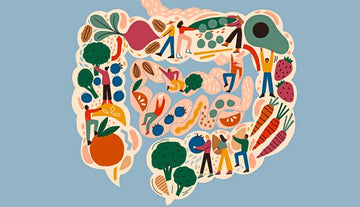
Caffita - Low Acid - Prebiotic Coffee
Lets talk about gut health.
It’s a hot topic these days, and it seems like everyone has something to say about it, but how can we understand it best? We'll ask the following question to get started.
Why is Gut Health Important?
Think of your gut as its own tiny civilization, a self-sustaining “planet” of sorts with billions of tiny inhabitants, going about their business doing gut bacteria things. Some of these bacteria are good for your overall well-being, some of them are not.
What is good gut health bacteria?
Among the good are probiotics, living strains of healthy gut-bacteria that help fight off infection, and combat inflammation.
All day, and even at night, these loyal citizens are hustling around making important phone calls, balancing spreadsheets, and occasionally flirting with Tina from accounting to pass the time. All this so they can run your body well.
Just like us, these creatures need food to survive. But if they want to thrive, they need good food.
What are Prebiotics?
This is where prebiotics come in - prebiotics are the food that probiotics eat to grow in numbers, and gain the energy needed to perform their duties well.
But here is the catch: with poor dietary habits, most people make their gut’s job way, way harder. Instead of an army of fit, dedicated go-getters eager to perform, the typical American diet leaves our gut warriors tired, slow, and out of shape - eventually subjecting their hosts to the same fate.
What are the consequences of bad gut health?
Poor gut health will subject people to a variety of health defects, most of which the average American will recognize - fatigue, mental sluggishness, and indigestion to name a few. Its important to remember that these conditions make way for other, worse conditions, giving us all the more incentive to improve our dietary habits, and avoid them.
Why does eating or drinking make me tired?
Everything the body does - from pumping the heart, using your brain to solve new problems, and digesting food - requires energy. We can think of this energy as a sort of currency, like money, that your body needs to spend in order to perform certain operations, with digestion being one of them. Some dietary practices are more "expensive" for your gut to process than others, such as those that contain excess acidity. This leaves us with less resources to perform other processes well, like thinking clearly and quickly.
Why is it hard to focus after eating?
Among the most metabolically expensive processes for your brain and body is learning - a process we do each time we try to solve new problems. Especially in the fast-paced, performance oriented conditions that many American's find themselves in, solving problems is simply a reality of daily life. Also, we have good reason to want to optimize our brain to learn well - the ability to do so is often a key indicator of career and life fulfillment.
Unfortunately, when we spend too much energy on digesting foods with excess acids, carbs, or generally inflammatory content, our body's balance sheet runs into the red, and we don't have enough "currency" to perform this critical operation. We experience this process as fatigue.
How do I Improve My Gut Health?
Luckily, the ability to think clearly and quickly is a skill that can be more than marginally improved by simple changes in dietary habits. One of the easiest ways to improve on this front is by working something different into your pre-established routines - in this case, your morning coffee ritual.
By decreasing the acidity of your morning brew, you are incurring less debt for your gut to process, and will be left with more currency to effectively perform your daily tasks. If you've read some of our other work, you know we're big on the science of quality spending habits.
Our body needs rest, or consistently healthy dietary practices, to begin building up its stores of currency, so it may spend not just on basic life-support tasks, but investments for your well-being, such as focusing on and learning new skills for your career, and conducting important quality of life-maintenance tasks like exercise, cleaning your room, and getting to bed on time. Poor dietary choices compromise our brain's likelihood to successfully make these investments, which is unfortunate, as these are the behaviors that allow us to thrive in our lives - mentally, emotionally, financially, spiritually, or otherwise. So don't sleep on gut health!
Summary
Some of the healthiest and most successful individuals are often so because of their abundant stores of personal energy. They've bee able to build up these stores as a result of good habits, which often includes limiting caffeine use. This, in turn, allows them to build up a surplus of currency reserves to allow their body's to invest in useful, competitive operations like focusing, learning, and problem-solving, more than others. Just ask six time super bowl champion, Tom Brady, about his position on setting a daily caffeine limit.
This cognitive surplus gives them a significant market advantage over their peers, and research suggests it probably makes them happier too.
Most of us don’t want to hear it, but excess coffee, and more specifically, the caffeine in that coffee, is in fact a nutritionally high-cost loan we borrow on a regular basis, and demand that our loyal gut-minions work overtime to pay it off.
With uninterrupted, long-term coffee and caffeine consumption, this debt has no chance to be settled. Subsequently the ratio of bad bacteria to good bacteria (probiotics) skews towards the bad, and we experience a host of adverse health and wellness conditions.
Before we go on, we want to stress that there are indeed a wide range of health benefits that coffee offers, and when used wisely, it is a force multiplier in your daily routine, and for your brain. We’ll cover those benefits in a separate article.
Where can I get low acid coffee?
We prepared Caffita with the problem above in mind. With around half the caffeine content per bag as regular coffee, and a whole fixin' of prebiotics, Caffita constitutes the break your body needs to build up its energy reserves, so your body and mind can invest in your success. Also, our customers report that there is no discernable difference in taste from our regular, notoriously delicious coffee, so fear not in the flavor department.
Should you wait any longer to make decisions that may improve your daily mental game? Can you afford to? On matters of such importance, the answer can only be a resounding no - when a simple short or long-term change in your coffee routine could make all the difference for your performance, the question remains, why not?




